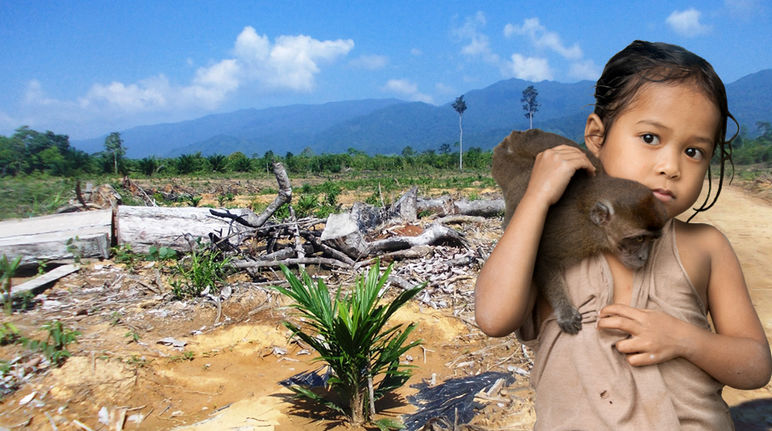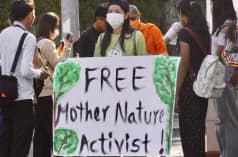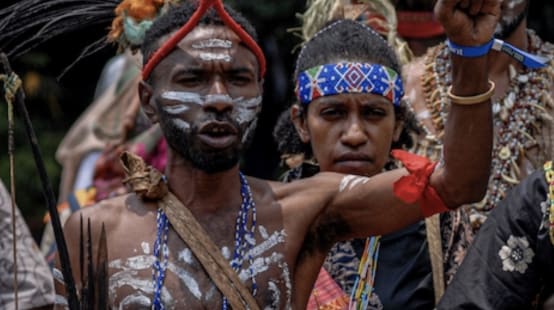The Philippines: stop the palm oil rush in Palawan
 Nowhere to live: converting land into oil palm plantations (© Collage - ALDAW)
Nowhere to live: converting land into oil palm plantations (© Collage - ALDAW)
The proposal to convert further 8 million hectares of Philippine soil into oil palm plantations made headlines across the country and shed a harsh light on how Philippine authorities imagine their country's development. Call on the Governor of Palawan to save the Palawan Man & Biosphere Reserve!
Call to actionTo: Governor of Palawan Jose Chaves Alvarez; Vice-Governor Dennis Socrates
“Call on the Governor of Palawan to save the Palawan Man & Biosphere Reserve from the oil palm rush.”
Palawan, also known as the ‘Philippines’ Last Frontier’, is witnessing one of the largest-ever conversions of land into oil palm estates. Existing industrial-scale plantations have already inflicted irreparable damage to precious environments and to the livelihoods of hundreds of communities.
Palm oil companies are planning to convert 20,000 hectares of land in the Philippines' Palawan Man & Biosphere Reserve. 6,000 hectares have already been cleared, endangering biodiversity, water resources, topsoil quality and the livelihood of farmers and indigenous peoples, while exacerbating rural poverty. If oil palm expansion is allowed to continue, the environmental and ecological sustainability of the province and local food security will be severely compromised.
While Agumil Philippines, Inc. – the largest palm oil company in Palawan – freely exports palm oil to Malaysian buyers, local farmers have nothing to feed their families or anything to take to the local market. “Agumil does not even allow us to intercrop cassava on our land, which they have converted into oil palm plantations,” says Jerry Azucena of the newly established Coalition against Land Grabbing (CALG). “They have destroyed our lives, and sooner or later they will have to compensate us,” he adds.
The joint call of indigenous peoples and farmers asking Governor Jose C. Alvarez for a moratorium on oil palm expansion is the only workable solution to reverse this trend. The provincial government must take effective action without delay. Please support their petition.
BackgroundLocal protests
On September 29, a petition signed by more than 4,200 farmers and indigenous peoples was delivered to Palawan Vice-Governor Dennis Socrates, urging him to support the people’s call for a moratorium on oil palm expansion.
As oil palm expansion continues unabated, the livelihoods of small farmers and indigenous peoples are being severely jeopardized. “We are being strangled by huge debts to both Agumil Philippines, Inc. and the LandBank, and our land titles are being withheld by the bank as collateral,” says CALG Secretary Welly Mandi. “Until now, we have seen nothing more than a naked attempt by the bank to shield itself from accountability for the destructive impacts of oil palm plantations in our province,” says CALG’s Chairman, Motalib Kemil. “The bank should make plans for restoring the livelihoods of the affected communities through the oil palm projects they have financed and stop committing other funds to irresponsible agribusiness.”
ALDAW (Ancestral Land/Domain Watch), the leading local organization in the anti-oil palm campaign, believes that diverting agricultural production away from staple foods and endemic coconuts toward oil palms is an irresponsible choice that will jeopardize the survival of future rural generations.
CALG is the newly established Coalition against Land Grabbing, a grassroots-based group in charge of monitoring the expansion of plantations at the community level. Its role was pivotal in the circulation and signing of the petition calling for moratorium on oil palm expansion.
More information, see Philippines: Local Palawaños Stand Strong Against Oil Palm Expansion
The UNESCO on the Palawan Man & Biosphere Reserve
Copies of this petition will be delivered with all signatures to:
The Governor of Palawan, Jose Chaves Alvarez
Vice-Governor Dennis Socrates
H.E. Benigno C. Aquino III, President of the Republic
Dr. Marlea Pinor Munez, Executive Director, National Commission on Indigenous Peoples (NCIP)
Hon. Ramon Jesus Paje, Secretary, Department of Environment and Natural Resources (DENR)
Hon. Proceso J. Alcala, Secretary, Department of Agriculture (DA)
Euclides G. Forbes and Carlos B. Carpio, Philippine Coconut Authority - PCA
Mr. Nelson P. Devanadera, Executive Director, Palawan Council for Sustainable Development (PCSD)
Mrs. Gilda E. Pico, President and CEO, Land Bank of the Philippines
Irina Bukova, Director-General, UNESCO
To: Governor of Palawan Jose Chaves Alvarez; Vice-Governor Dennis Socrates
Ladies and Gentlemen,
I am writing to express my support for the joint call of Philippine indigenous peoples and farmers to:
– immediately issue a moratorium on the expansion of oil palm plantations in Palawan;
– impose penalties on Agumil Philippines, Inc. and other oil palm companies for violating the Strategic Environmental Plan (R.A. 7611), the Indigenous Peoples’ Rights Act (Republic Act No. 8371), Executive Order No. 23 (banning the cutting of trees in natural and residual forest, nationwide) and other existing laws;
– stop the planting and tending of oil palms in areas that have been documented as timberland, ancestral land domains, etc., eradicate existing oil palms in such locations and rehabilitate deforested areas by replanting endemic tree species.
For those oil palm plantations that have been established on the basis of unfair agreements between Agumil Philippines, Inc. and farmers:
– amend and revise the terms and conditions of Production Technical Market Agreements (PTMA) and Management Services Agreements (MSAs) that have been drawn up to unfairly benefit Agumil Philippines, Inc. at the cost of farmers’ cooperatives;
– ensure that Agumil Philippines, Inc. and other agribusiness enterprises comply with labor laws in order to improve conditions for plantation workers and provide them with benefits and adequate forms of insurance.
Sincerely,
The issue – rainforest on our dinner tables and in our fuel tanks
At 66 million tons annually, palm oil is the most commonly produced vegetable oil. Its low world market price and properties that lend themselves to processed foods have led the food industry to use it in half of all supermarket products. Palm oil can be found in frozen pizzas, biscuits and margarine, as well as body creams, soaps, makeup, candles and detergents.
Few people realize that almost half of the palm oil imported into the EU is used as biofuel. Since 2009, the mandatory blending of biofuels into motor vehicle fuels has been a major cause of deforestation.
Oil palm plantations currently cover more than 27 million hectares of the Earth’s surface. Forests and human settlements have been destroyed and replaced by “green deserts” containing virtually no biodiversity on an area the size of New Zealand.
The impact – suffering and death in producer countries, climate havoc
The warm, humid climate of the tropics offers perfect growth conditions for oil palms. Day after day, huge tracts of rainforest in Southeast Asia, Latin America and Africa are being bulldozed or torched to make room for more plantations, releasing vast amounts of carbon into the atmosphere. As a consequence, Indonesia – the world’s largest producer of palm oil – temporarily surpassed the United States in terms of greenhouse gas emissions in 2015. With their CO2 and methane emissions, palm oil-based biofuels actually have three times the climate impact of traditional fossil fuels.
Palm oil is not only bad for the climate: As their forest habitat is cleared, endangered species such as the orangutan, Borneo elephant and Sumatran tiger are being pushed closer to extinction. Smallholders and indigenous people who have inhabited and protected the forest for generations are often brutally driven from their land. In Indonesia, more than 700 land conflicts are related to the palm oil industry. Human rights violations are everyday occurrences, even on supposedly “sustainable” and “organic” plantations.
As consumers, we are largely unaware of these broader issues, yet our daily palm oil consumption also impacts our health: refined palm oil contains large amounts of harmful fatty acid esters that are known to damage DNA and cause cancer.
The solution – a revolution on our dinner tables and in our fuel tanks
Only 70,000 orangutans still roam the forests of Southeast Asia, yet the EU’s biofuels policy is pushing them to the brink of extinction. Every new plantation on Borneo is destroying a further piece of their habitat. Stepping up the pressure on policymakers is a must if we want to save our tree-dwelling kin. Apart from that, however, there is still a lot we can do in day-to-day life.
Follow these simple tips to recognize, avoid and combat palm oil:
- Enjoy a home-cooked meal: Use your imagination: why not try almond-coconut-pear biscuits? Or pizza with potato and rosemary? A meal cooked from fresh ingredients beats processed foods containing palm oil every time. Oils such as sunflower, olive, rapeseed or flaxseed are ideal for cooking and baking.
- Read labels: As of December 2014, labeling regulations in the EU require food products to clearly indicate that they contain palm oil. However, in the case of non-food items such as cosmetics and cleaning products, a wide range of chemical names may still be used to hide the use of palm oil. A quick check of your favorite search engine will turn up palm oil-free alternatives, however.
- Remember that the customer is king: Ask your retailers for palm oil-free products. Write product manufacturers and ask them why they aren’t using domestic oils. Companies can be quite sensitive to issues that give their products a bad name, so inquiring with sales staff and contacting manufacturers can make a real difference. Public pressure and increased awareness of the problem have already prompted some producers to stop using palm oil.
- Sign petitions and write your elected representatives: Online campaigns put pressure on policymakers responsible for biofuels and palm oil imports. Have you already signed all of Rainforest Rescue’s petitions?
- Speak out: Protest marches and creative action on the street raise public and media awareness of the issue, which in turn steps up the pressure on policymakers.
- Leave your car at home: Whenever you can, walk, ride a bicycle or use public transport.
- Be informed and inform others: Big Business and governments would like us to believe that biofuels are good for the climate and that oil palm plantations are sustainable. Spread the word – share this information with your family and friends and encourage them to rethink their consumption habits. It’s in our hands!













 Recent successes
Recent successes